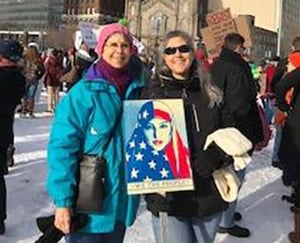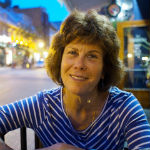Published: April 3, 2018
 Women’s History Month in March is an opportunity for women to reflect on issues they dealt with and fought for during their lifetime, and how the landscape of women’s rights looks today.
Women’s History Month in March is an opportunity for women to reflect on issues they dealt with and fought for during their lifetime, and how the landscape of women’s rights looks today.
Many residents at Kendal at Oberlin have played active roles in the women’s movement. Last month we talked with two of them, plus Kendal’s board chair, about their experiences.
Mary Van Nortwick & the League of Women Voters
Mary moved to Oberlin in 1965 and got involved with the city’s League of Women Voters. The league was a vibrant organization then, in part because educated women like Mary had limited job opportunities, so they turned their talent and energy into volunteering for social change.
Then the women’s movement came, and Oberlin’s League faltered because women now had more opportunities in the workplace. For instance, Oberlin College dropped its nepotism rule that prohibited hiring wives of current faculty members.
Kendal’s opening in 1993 brought many activist women back to Oberlin. They were retired and had time to devote to reviving the League. “Kendal was truly instrumental,” Mary says.
After retiring in 2003 from the University of Akron, where she taught English and Canadian Studies, Mary also got more active in the League. She is currently co-president of the League of Women Voters of Ohio and a member of the Oberlin Area League.
League membership is open to men (Mary’s husband Tom is a member), but the organization decided not to change the name because of its historical roots: Suffragists created the League in 1920, just six months before the U.S. Constitution was amended to give women the right to vote.
The League is non-partisan, which means it does not support candidates or political parties, but instead takes positions on issues after an in-depth study.
Issues the League supports include:
- Ohio Issue 1, which would create a bipartisan, public process for drawing Congressional districts, and is on the May 8 ballot
- Affordable health care coverage for all, including birth control, abortion access and other reproductive coverage
- Sensible gun control laws. “This is a public health issue,” she says.
Like thousands of others, Mary participated in the March for Our Lives rally last month.
“I’ve been doing this since I was 22,” Mary says.
She marched in Oberlin on May 4, 1970 to protest the Ohio National Guard shooting at Kent State University that left four students dead. Marching with her was her 3-year-old son, who marched on March 24, 2018 in New Jersey with his 3-year-old daughter.
“To think our students are still being killed,” she says.
Now in her 70s and living at Kendal, Mary thinks back to her early years of social activism, and what’s going on today.
“There was a lot of optimism beginning in the mid-1960s and many did not think we would have to fight again for the civil rights women and minorities had gained. A lot of us are dismayed at the present efforts to roll back these gains, but we are seeing a new activism today because people have begun to realize they can’t ever take their rights for granted,” she says.
Erika Pilisy & the National Organization for Women
Kendal resident, Erika, 83 years old and a retired teacher, sat down for an interview with an Oberlin College student to talk about her activism during the early days of the women’s movement. The entire interview can be heard here.
Here are excerpts from Erika’s interview:
“When I was still in high school I worked for a company called Three Sisters. It was a women's clothing store. I worked there after school on Saturdays and I was in the credit department. Frankly, I ran the credit department and I really enjoyed the job. Then I was engaged to be married and my future husband didn't want me to work Saturdays, so I was looking for another job. At that point, I had to train a man to take over. Here I am training him and he will be making three times the amount of money that I would be making even after I graduate.”
“In the mid-70s Betty Ford was touring Cleveland. I went and as I listened to her, I was quite, quite inspired as she in her slow way of speaking made a point that women have a right to be who they can or wish to be. And I just sat there and took it all in, and I changed my attitude towards what I wanted out of life.”
“I went to the meetings for National Organization For Women in Cleveland and, within a few months, was chairing the membership committee. In 1983 they had a big meeting to celebrate the 10th anniversary of Roe v Wade. Somehow or other, I ended up being on the panel and the panel consisted of a world travel doctor, a Ph.D. nurse, Representative Louis Stokes and little old me. I spoke, and afterward when I went back to my seat. Rep. Stokes kind of patted me on the arm and he said, ‘Now, this is what I need to take back to Washington’.”
“In 1989 I was president of Cleveland East NOW, and we were organizing for the trip to Washington march. The march was something, how do I even describe it? We had a rally at Cleveland State … wonderful support. We gathered near the Washington memorial. The march started at 10:00 A.M. By then they had us organized by states and we had our banners. A sense of togetherness, sense of sisterhood, it was wonderful.”
“My marriage was kind of falling apart because part of where I needed to make huge changes was to be an equal partner in the marriage. And obviously I was not considered one and therefore I wasn't satisfied. I wasn't happy. I felt I need to be me, such as Betty Ford has said, and I don't want any more anchors hanging on my side because I saw myself as somebody more than, ‘what's for dinner, honey’. Of course there was always dinner. Yes, every dinner was cooked from scratch, but that would not keep me from going to classes. Mostly I would take evening classes not to interfere with family life. I finished my bachelor's when I was 55 and I finished my master's when I was 60.
Erika describes one of the skits at a NOW anniversary celebration/fundraiser held at Cleveland State: “There was one scene where this mother is reading fairy tales to her daughter, and she says ‘Why do we have to have a knight in shining armor? Who needs that? We women can do better than that.’ And then the curtain closes and I kind of shuffle my way, and I had a super duper pooper scooper as my prop. And then I stopped on stage, and I said ‘She who waits for Prince Charming gets to pick up after his horse.’ So we had our light moments.”
Although Erika is no longer able to march, she continues to support women’s rights issues. She sponsored a woman to attend the 2017 Women’s March in Washington, with the message: “Carry on.”
Liz Burgess & Life of Activism
Liz’s first march was at age 13, protesting the Vietnam War in D.C. with her college-age sister, her most recent was last month’s March for Our Lives, with dozens of others in between.
“In the early 1970s Gloria Steinem came to Oberlin College and she encouraged us to get involved,” says Liz, a 1973 Oberlin College graduate, and now chair of Kendal’s board of directors.
Liz’s early work on behalf of women’s rights touched many organizations, including:
- the Sexual Information student group, which helped students find information about birth control
- the Women’s Service Center, which provided the area’s first rape crisis hotline
- and the county’s first domestic violence shelter
Then a period of inactivity followed. “The arc of justice was leaning in the right direction and we got complacent,” she says. “Now we’re back in active mode to protect our rights.”
Liz is involved with Lorain County Rising, an all-volunteer group that was formed after the 2016 presidential election
Says Liz, “I’m very encouraged by the response of young people.”
 In the past, Molly Kavanaugh frequently wrote about Kendal at Oberlin for the Cleveland Plain Dealer, where she was a reporter for 16 years. Now we are happy to have her writing for the Kendal at Oberlin Community.
In the past, Molly Kavanaugh frequently wrote about Kendal at Oberlin for the Cleveland Plain Dealer, where she was a reporter for 16 years. Now we are happy to have her writing for the Kendal at Oberlin Community.





